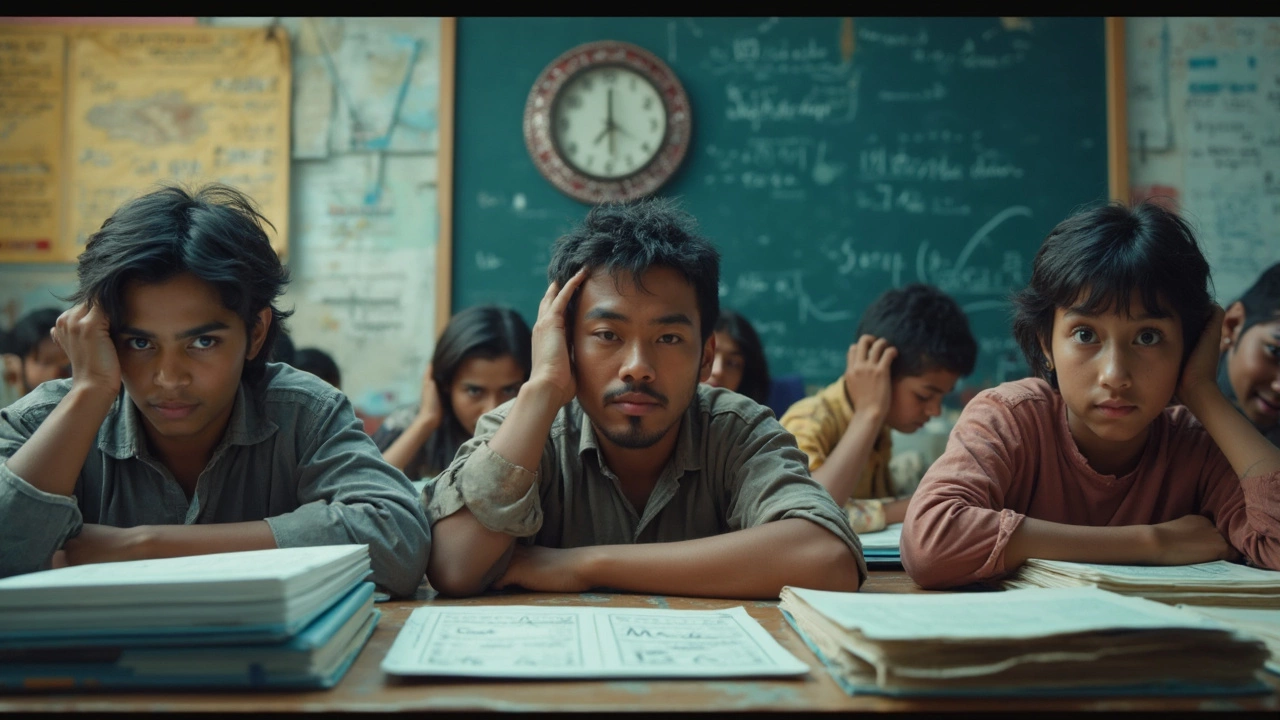Hardest Exams Ever: Which Test Truly Earns the Title of Toughest in the World?
 Jun, 26 2025
Jun, 26 2025
You think your finals were hard? Imagine an exam so cruel it breaks Olympic athletes, chess prodigies, and math geniuses alike. The search for the hardest exam of all time isn’t just a nerdy debate—it’s a global obsession. People train for years, families pin their hopes on a single test, and success (or failure) can change the fate of an entire country. Behind every exam room door, there are nerves, ambition, and occasionally, absolute heartbreak.
The Usual Suspects: What Makes an Exam Brutally Tough?
What even counts as “hard” when it comes to exams? It’s not just tricky questions—there’s endurance, competition, weird formats, and terrible odds. Let’s talk benchmarks. Is it the Indian UPSC Civil Services, China’s Gaokao, the MIT entrance test, the Putnam math contest, or the ultra-rare Master Sommelier exam? These tests all show up on ‘World’s Toughest’ lists for good reason, but each brings its own flavor of pain.
First, the stakes. In India, the UPSC decides who will run a country of 1.4 billion. You might have less than a 0.2% chance of getting through. No retakes for a year. Meanwhile, in China, the Gaokao is how 10 million high schoolers fight for a shot at the best universities each summer. The entire country more or less shuts down and exams last nine hours over two days. Parents hire psychological coaches, rent apartments near test centers, and take time off work to cook brain food for their kids. Pressure? Off the scale.
And then, there’s content. Some exams hit you with brain-freezing math, like the William Lowell Putnam Mathematical Competition. Some students end up getting negative scores. In contrast, the Master Sommelier’s tasting exam pushes candidates to name a wine’s grape, country, region, and vintage after just one sip—one in ten pass. Think your palate is good? These folks identify obscure Hungarian wines blindfolded.
Then you have the USMLE in America, where medical residents go through three steps—some tests last eight hours, with questions that can have several correct-looking answers hiding traps. Finally, the Mensa IQ test and the CFA for finance both require not only immense preparation but a knack for out-of-the-box thinking that textbooks can’t always teach.
So what do these have in common? Fear, preparation marathons, ruthless competition, and a sense that one small mistake means game over. The content is grueling, but the psychological weight can be even harder. Many candidates talk about sleepless nights, doctors warning about health risks, and, sometimes, years of trying before success.
Legendary Exams: Gaokao, UPSC & the Rest
Let’s zoom in on a few legends. The Gaokao is notorious for a reason. Every June, nearly 13 million Chinese students sit for two days of testing that will decide their life’s path. No pressure, right? The math section has questions likely to floor even many math teachers elsewhere—like “In a triangle, if the three sides are given…” and then diving into calculus meets geometry, all under relentless time pressure. English is another big hurdle, especially for rural kids who may have never spoken the language in real life. Some spend two years preparing in boarding camps called ‘study bootcamps’. If they don’t succeed? They might do it all again next year.
Now, the UPSC in India. This journey takes a year or more, starting with Prelims, where you get two hours for each paper of multiple choice questions, followed by ‘Mains’—nine essay-type papers across subjects from history to ethics. Topping it off, there’s a personality interview. In 2023, about 1.2 million applied. Less than 1,000 made it into the final selection. To win, you need encyclopedic memory, a sharp analytical brain, and the stamina to study up to 12 hours a day for months. Some folks give up their social life for two or three years.
Let’s not forget Japan’s National Center Test, the notoriously unpredictable bar exam in the US (the pass rates in California sometimes dip below 40%), or the French Agrégation where would-be teachers get grilled for months on obscure literary topics.
The Putnam math competition, held every December across US and Canada, has an infamous problem-solving section. In 2021, the median score was 1 out of 120. Yes, you read that right. Half of competitors, mostly math prodigies, got nearly everything wrong. That’s how insane the level is.
Meanwhile, exams like the Master Sommelier have oral tests where a panel grills you for hours, and you only pass if you can impress pros who have spent decades in fine dining. There are horror stories of candidates fainting, nerves shot before the test even begins. Fewer than 300 people have ever passed all three MS exams since the test began in 1969.
Just for fun, here’s a quick table comparing some of these tests:
| Exam | Country | Years Since Inception | Acceptance Rate | Typical Duration |
|---|---|---|---|---|
| Gaokao | China | 1952 | ~2% | 9 hours (over 2 days) |
| UPSC Civil Services | India | 1855 | 0.2% | 1 year (all stages) |
| Putnam Competition | US/Canada | 1938 | 1-2% get positive score | 6 hours |
| Master Sommelier | Worldwide | 1969 | 10% | Up to 3 hours (per exam stage) |
| CFA Level 1 | Worldwide | 1963 | 41% | 6 hours |
So which is the hardest? Honestly, it depends on your definition of pain. But there’s a clear pattern: the most brutal tests challenge not just what you know, but how far you’ll push yourself under fire. Whether it’s a million competitors or a million wine varietals, the pressure is very, very real.

Weird, Surprising, and Obscure Impossible Exams
Did you know North Korea’s final high-school exam is so tough that it’s rumored some teens never open their result envelopes? Or that France’s Grand concours opens with a philosophy section where the first question in 2022 was simply “Is hope an illusion?” Not exactly a multiple choice warm-up.
Then you’ve got Russia’s mathematical Olympiads, which regularly stump even university scholars. Some of these problems are so gnarly they take weeks to solve—and that’s with no time pressure. In Singapore, the PSLE math exam recently went viral for questions about “honeydew melons divided by carts” that had entire parents’ WhatsApp groups in meltdown. (There are memes about surviving it.)
Ever heard of the Mensa IQ test for entry to the high-IQ society? It’s not just logic puzzles–candidates get just a few minutes to solve fiendishly difficult sequences, words, and spatial reasoning tasks designed to weed out all but the top 2%. Passing is like being handed the Willy Wonka golden ticket for your brain.
But perhaps the weirdest: the Japanese Kanji Kentei Level 1. You need to master over 6,000 obscure Chinese characters, including the historical roots, correct stroke orders, and multiple readings. Maybe five people pass it a year, out of thousands. (One guy became a mini-celebrity just for acing it—local TV followed him for weeks.)
This brings us to a hidden champion: Germany’s Staatsexamen for aspiring lawyers and doctors. This “state exam” takes two full years to prep, has hoops like oral defenses judged by stern panels, and it’s so intimidating that first-time pass rates hover around 50%. The second attempt is even tougher: The examiners know you failed once, so they’re less forgiving. In the ‘90s, dismissing a candidate for nervous hand-tremors was considered “normal.”
In Hungary, budding composers have to pass an exam that demands not only technical music theory, but the ability to improvise a fugue on piano. Good luck faking your way through that unless you’re the next Bach.
While the famous tests get the spotlight, these lesser-known monsters remind us how culture, tradition, and local quirks shape what people consider “difficult.” Some are technical, others psychological. But every one leaves a trail of legends, memes, and, frankly, war stories wherever it goes.
Toughest Tips: How to Survive the Impossible Exam
Ready to tackle one of these infamous monsters yourself? Besides buying a year’s supply of coffee and a neck massager, here are tips that winners swear by:
- Start Early: Toppers for tests like UPSC, Gaokao, or CFA often start 12-18 months ahead. The earliest birds don’t just catch the worm; they eat breakfast, lunch, and dinner at their desk.
- Mock Exams Are Gold: Olympiad champions say routine mock tests build real immunity to the freeze of exam day nerves. Gaokao students do as many as 30 full-length past papers. New questions rarely surprise them.
- Active Recall Over Passive Reading: Neuroscientists found that writing answers, teaching a friend, or quizzing yourself daily boosts memory 80% over simple reading or highlighting. Real learning sticks when you’re challenged to pull info from your brain, not just review it.
- Practice Zen Habits: The bios of recent Master Sommelier passers sound like mindfulness textbooks. Visualization, journaling, even breathing exercises to lower cortisol levels matter on “do-or-die” day.
- Sleep Is Magic: A study from Stanford tracked Putnam winners who averaged 7-8 hours of sleep and did 20% better than exhausted rivals, probably due to sharper processing.
- Peer Groups & Mentors: Virtually every UPSC topper got help from a mentor or small, hyper-focused study group. You learn more by teaching and debating than scrolling through apps alone.
- Break Big Goals Into Bits: If your test covers 10,000 flashcards, start with 50 at a time. Divide and conquer beats meltdown every time.
- Build in Rewards: Olympiad kids often gamify their prep; every 2-3 hour study streak earns a movie or a meal out. Tiny bribes keep you going on the darkest days.
- Embrace the Suck: People remember the pain, but also the pride. Surviving these monsters gives you legendary bragging rights.
In survey after survey, toppers rate “grit” even higher than talent. Many who came out on top failed once (or more), but their hunger outlasted the setbacks. Cracking the hardest exam is always more than rote learning. It’s juggling facts, nerves, dreams, and sometimes, a little luck.
So, which is the hardest exam of all time? The answer morphs by country, subject, and era—but the winner always leaves a trail of mind-boggling stories and humble pie. If you’re gearing up for your own “monster test,” remember: Every legend started with a first, terrified mock exam. Maybe next time, you’ll be the one the world’s talking about.